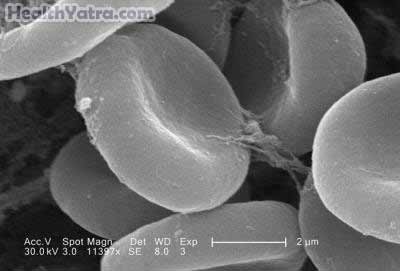परिभाषा
Folic acid deficiency means that there is a lower than normal amount of folic acid in your blood. Folic acid is a water soluble B vitamin, which means it cannot be stored in the body. You must get a continual supply of it.
This B vitamin plays a role in:
- Building proteins in the body
- Producing DNA
- Helping to form red blood cells
Lack of folic acid leads to a type of blood disorder called megaloblastic anemia. There are many types of anemia. Megaloblastic anemia is mainly characterized by larger than normal red blood cells in the blood. After your doctor determines you have a folic acid deficiency this condition can easily be treated.

का कारण बनता है
There are several causes of folic acid deficiency, including the following:
- Inadequate dietary intake of folic acid due to:
- Limited consumption of fresh, minimally cooked food
- Chronic alcoholism
- Long-term need for intravenous nutrition (total parenteral nutrition)
- Inadequate absorption of folic acid due to:
- Malabsorption syndromes, such as celiac disease
- Drug interactions, such as anticonvulsant medicines and oral contraceptives
- Increased need for folic acid due to:
- गर्भावस्था
- Lactation
- Infancy
- Malignancy (eg, cancer)
- Increased loss
- हीमोडायलिसिस
- Impaired use
- Certain medicines (eg, methotrexate )
जोखिम कारक
The following risk factors increase your chance of developing a folic acid deficiency. Tell your doctor if you are concerned you have an increased need for folic acid due to the following conditions:
- Pregnancy or lactation (breastfeeding)
- Malignancy
- यकृत रोग
- शराब
- Chronic hemolytic anemia
- Kidney dialysis treatment
- Celiac disease or other malabsorption disorders
- Need for certain medicines such as anticonvulsants and oral contraceptives
- Elevated homocysteine levels in the blood
लक्षण
If you experience any of these symptoms, do not assume it is due to folic acid deficiency. These symptoms may be caused by other conditions. If you experience any one of them, see your physician.
- थकान
- सिरदर्द
- पीलापन (पीली त्वचा)
- Grey hair
- Red, irritated, swollen, and sometimes shiny tongue
- Mouth ulcers
- Shortness of breath and dizziness
- Change in bowel pattern ( diarrhea usually)
- Elevated level of homocysteine in the blood (a heart disease risk factor)
निदान
Your doctor will ask about your symptoms and medical history, and perform a physical exam. He or she will also perform simple blood tests to confirm a diagnosis of megaloblastic anemia, and most importantly, determine the cause of the anemia.
It is difficult to distinguish between folic acid deficiency and vitamin B12 deficiency. However, folic acid deficiency is confirmed only by measuring red blood cell (RBC) folate levels in the blood.
It is especially important to confirm a diagnosis of folic acid deficiency before treatment with supplemental folic acid begins. Mistreating an actual vitamin B12 deficiency with supplemental folic acid will mask the vitamin B12 deficiency, meaning the anemia will be corrected, but the neurological damage associated with vitamin B12 deficiency will progress.
Blood tests may include the following:
- Hemoglobin—will be lower than normal if any type of anemia is present
- Mean corpuscular volume (MCV)—measures the size of the red blood cell and will be larger than normal if folic acid deficiency is present
- Color of the red blood cell—will be normal if folic acid deficiency is present
- Serum folic acid—values of less than 5 ng/mL suggest a folic acid deficiency
- Red blood cell (RBC) folate—low levels confirm a diagnosis of folic acid deficiency
उपचार
Folic acid deficiency is usually treated with 1,000 micrograms of supplemental folic acid, given once a day until folic acid levels are replenished. The anemia usually is corrected within two months.
रोकथाम
It is possible to consume enough folic acid by eating a balanced, varied diet including rich sources of folate, the food form of folic acid. The recommended dietary allowance (RDA) for folic acid is 400 micrograms per day for most adults.
To get enough folate, consume plenty of the following foods:
- Fortified grains, cereals, and bread products
- Dried beans and legumes
- Poultry, pork, liver, and shellfish
- A variety of fresh fruits and vegetables, especially:
- Dark, green leafy vegetables such as spinach, lettuce, asparagus, and broccoli
- Citrus fruits and juices
